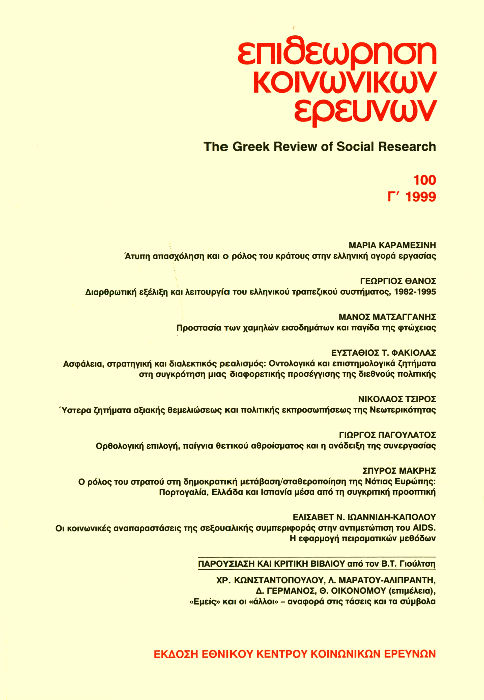Άτυπη απασχόληση και ο ρόλος του κράτους στην ελληνική αγορά εργασίας
Abstract
Το εργασιακό πρότυπο στη μεταπολεμική Ελλάδα διέφερε σημαντικά από αυτό
της πλήρους, σταθερής και ρυθμισμένης μισθωτής απασχόλησης, που ίσχυε στις οικονομικά αναπτυγμένες χώρες την ίδια περίοδο και αποτέλεσε το πρότυπο αναφοράς για τον ορισμό της τυπικής απασχόλησης. Η διαδικασία σύγκλισης με το φορντιστικό πρότυπο μισθωτής απασχόλησης που έλαβε χώρα στην Ελλάδα μετά την πτώση της δικτατορίας δεν περιόρισε τις παραδοσιακές άτυπες μορφές απασχόλησης (αυτοαπασχόληση, απλήρωτη εργασία στην οικογενειακή επιχείρηση, εποχιακή απασχόληση, ανασφάλιστη εργασία). Αντίθετα, δίπλα στις τελευταίες, προσέθεσε νέες, που εμφανίσθηκαν ως αντίδραση στην παραπάνω διαδικασία. Το κράτος συνέβαλε στην εξάπλωση της άτυπης απασχόλησης περισσότερο με την ανοχή του στις παραβιάσεις της εργατικής και κοινωνικής νομοθεσίας παρά μέσω άμεσης παρέμβασης.
Article Details
- How to Cite
-
Καραμεσίνη Μ. (1999). Άτυπη απασχόληση και ο ρόλος του κράτους στην ελληνική αγορά εργασίας. The Greek Review of Social Research, 100, 3–32. https://doi.org/10.12681/grsr.750
- Issue
- 1999: 100, Γ'
- Section
- Articles

This work is licensed under a Creative Commons Attribution-NonCommercial 4.0 International License.
Authors who publish with this journal agree to the following terms:
- Authors retain copyright and grant the journal right of first publication with the work simultaneously licensed under a Creative Commons Attribution Non-Commercial License that allows others to share the work with an acknowledgement of the work's authorship and initial publication in this journal.
- Authors are able to enter into separate, additional contractual arrangements for the non-exclusive distribution of the journal's published version of the work (e.g. post it to an institutional repository or publish it in a book), with an acknowledgement of its initial publication in this journal.
- Authors are permitted and encouraged to post their work online (preferably in institutional repositories or on their website) prior to and during the submission process, as it can lead to productive exchanges, as well as earlier and greater citation of published work (See The Effect of Open Access).




